NEICE-Related Publications
ARCHIVE WEBSITE
The Institute ceased its activity and the charity was dissolved at the end of April 2013
This is a copy of the NEICE website active at that date
NEICE-Related Publications
Books Published on Theory and Research in
Christian Education and Practical Theology
NEICE 1981 – 2013
ARCHIVE WEBSITE
The Institute ceased its activity and the charity was dissolved at the end of April 2013
This is a copy of the NEICE website active at that date
Table of Contents
- How Faith Grows
- Christian Perspectives on Faith Development
- The Contours of Christian Education
- The Philosophy of Christian Religious Education
- Critical Perspectives on Christian Education
- Christian Theology and Religious Education
- Theological Perspectives on Christian Formation
- Planning to Learn
- Learning in the Way
- Creative Chords
- Psychological Perspectives on Prayer
- The Fourth R for the Third Millennium
- Children, Churches and Christian Learning
- Ordinary Theology
- Ways of Faith
- The Idea of a Christian University
- A Reader on Preaching
- Religion, Education and Adolescence
- Fragmented Faith?
- Peace or Violence
- Taking Ordinary Theology Seriously
- Empirical Theology in Texts and Tables
- Teaching Religion, Teaching Truth
- Exploring Ordinary Theology
See also Explorations in Practical, Pastoral and Empirical Theology Series for other publications in Practical Theology by Ashgate Publishing (now Routledge).
See also Religion, Education and Culture Series for other publications on Religion and Education by the University of Wales Press.
See also Adult Christian Education, Theology and RS Students for titles in the ‘Exploring Faith: Theology for Life’ series from Darton, Longman and Todd and the ‘Problems in Theology’ series from T & T Clark International, together with other titles for students and general readers.
See also Books of Popular/Ordinary Theology and Spirituality for more popular publications.
How Faith Grows
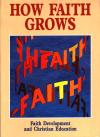
This Church of England report offers a critical introduction to faith development theory and research, and reviews the areas in which it might be fruitfully applied. ‘The team who have written How Faith Grows, and especially Jeff Astley as editor and principal writer, have done a lively and faithful job of communicating faith development research and theory. They have minted fresh language for communicating complex ideas in straightforward and engaging ways’ (Professor James W Fowler, Emory University). ‘An excellent introduction to Fowler’s theory, as well as the main lines of critical debate and the educational implications of the theory . . . a superb teaching resource’ (British Journal of Theological Education). 4,000 copies have been sold.
Jeff Astley et al., How Faith Grows: Faith Development and Christian Education
(London: National Society/Church House Publishing, 1991)
ISBN: 0 7151 4809 5 x + 102 pp £4.95
Contents OUT OF PRINT
Christian Perspectives on Faith Development
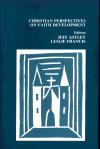
A reader which brings together thirty papers on the theology, philosophy and psychology of faith development, and its application in pastoral practice and education. ‘A well-signposted, balanced and critical account . . . an amazingly thorough job’ (Newsboard). ‘A clear and balanced presentation . . . of the whole range of critical debate and secondary research’ (British Journal of Theological Education). ‘A valuable resource’ (British Journal of Religious Education). ‘An excellent introduction to . . . faith development literature’ (Panorama). ‘Provides a good introduction to Fowler’s developmental theory and portrays the current state of play in the discussion of it from many points of view and from many different disciplines’ (Journal of Philosophy of Education). ‘Highly successful. . . An extremely important addition to the Fowler industry [that] plugs a significant gap by giving the reader access to a range of otherwise inaccessible material. It should become a standard reference work for any academic library and also find a place on the shelves of serious students of faith development studies. . . . A structured and highly usable format’ (Journal of Educational Administration and History).
Jeff Astley and Leslie J Francis (eds), Christian Perspectives on Faith Development: A Reader
(Leominster: Gracewing Fowler Wright/Grand Rapids, Mich: William B Eerdmans, 1992)
ISBN: 0 85244 220 3 xxiv + 411 pp £14.95
Contributors include: William Avery, C Ellis Nelson, James Fowler, Romney Moseley, Richard Osmer, Sharon Parks and Derek Webster.
The Contours of Christian Education
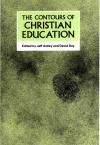
Published to mark NEICE’s tenth anniversary, this book draws on material from the Institute’s seminars and conferences. The twenty-six original essays cover a wide range of themes and address a number of controversial contemporary issues. ‘It ought to be on the shelf of clergy, theologians and religious educators as an important, well-thumbed reference work’ (Theology). ‘The quality of thinking behind many of these papers and the contributions of scholarship they make, amount to a powerful argument challenging the Church to take Christian education seriously. . . . This will be the standard volume in Christian education for some time to come.’ (British Journal of Educational Studies).
Jeff Astley and David Day (eds), The Contours of Christian Education
(Great Wakering: McCrimmons, 1992)
ISBN: 0 85597 495 8 428 pp £8.50
Contributors include: Jeff Astley, Edward Bailey, Stephen Barton, David Day, Leslie Francis, John Hull, Edward Hulmes, Robin Minney, Kevin Nichols, Bill Pickering, Elmer Thiessen and Richard Zipfel.
The Philosophy of Christian Religious Education
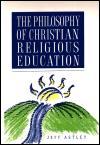
‘A thorough and comprehensive survey of the modern debate about the scope and purpose of religious education with special reference to developments in the philosophy of education and the philosophy of religion.’ The book presents ‘a well thought-out case for a type of Christian religious education which is both formative and critical’ (Basil Mitchell, Nolloth Professor Emeritus of the Philosophy of the Christian Religion at the University of Oxford). ‘Jeff Astley’s penetrating discussion of the central issues confronting Christian religious education makes fascinating reading . . . [giving] the reader a deeper understanding of how religious belief is to be communicated in today’s society’ (John M. Hull, University of Birmingham). ‘Makes use of the best American and British philosophy as applied to religious education’ (Randolph Crump Miller, Yale Divinity School). ‘A substantial volume on a subject of enduring significance’ (Warren S. Benson, Trinity Evangelical Divinity School). ‘The best work I have read in the area of the philosophy of Christian education. The work sets a standard that will be difficult to transcend. It is truly a seminal work, a book that must be read by anyone who wishes to write in this scholarly field in years to come’ (Leon McKenzie, Indianapolis).
‘Erudite and clearly written . . . the fruit of years of careful study’ (Theology). ‘A major achievement’ (Spectrum). ‘A stimulating and worthwhile book . . . rewarding and admirably thorough and set to become a classic in the field’ (British Journal of Theological Education). ‘Very suitable as a textbook in a variety of courses in Christian and religious education. . . . Astley’s work exemplifies the best in careful and patient philosophizing’ (Religious Education). ‘A big and important book [that] . . .deals with philosophical themes from a wide range of sources and should appeal to readers for many years to come’ (Panorama). ‘A philosopher’s book . . . thorough and scholarly’ (British Journal of Educational Studies).
Jeff Astley, The Philosophy of Christian Religious Education
(Birmingham, Ala.: Religious Education Press/London: SPCK, 1994)
ISBN: 0 281 04776 6 322 pp £25.00
Critical Perspectives on Christian Education
![[Book cover]](http://community.dur.ac.uk/neice/images/cpce2.jpg)
This reader brings together for the first time, in one volume, thirty-two key articles on the philosophy of Christian education, originally published in religious and secular journals in Britain, Europe, the USA, Canada and Australia. ‘A sophisticated and thorough overview of the debates’ (Heythrop Journal). ‘An excellent resource for those who wish to think rationally about Christian education in a pluralistic society’ (The Expository Times). ‘The editors’ overall knowledge of the issues involved is second to none’ (Theology). ‘I found Jeff Astley’s overviews the best of guides, pointing out both paths and pitfalls, readily available when needed, never obtrusive, always allowing, indeed encouraging me to make my own responses’ (British Journal of Educational Studies). ‘Sorted and introduced by Astley in a style that is a model of clarity, we find [here] a treasury of stimulating and occasionally provocative material’ (The Church of England Newspaper)..
Jeff Astley and Leslie J Francis (eds), Critical Perspectives on Christian Education: A Reader on the Aims, Principles and Philosophy of Christian Education
(Leominster: Gracewing Fowler Wright, 1994)
ISBN: 0 85244 254 8 xii + 513 pp £16.99
Contributors include: Trevor Cooling, Paul Hirst, Donald Hudson, Brian Hill, John Hull, Thomas Groome, Alasdair MacIntyre, T H McLaughlin, Basil Mitchell, Gabriel Moran, D Z Phillips, John Westerhoff and John Wilson.
Christian Theology and Religious Education
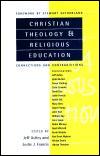
The sixteen original papers in this volume arose from an international symposium hosted by NEICE addressing theoretical and practical questions relevant to RE in schools, as well as to theological education in the churches. The book includes controversial attacks on, and equally controversial defences of, major Government documents on RE, together with in-depth analyses of fundamental theological issues relating to the teaching of the subject. A ‘timely book’ (Professor Sir Stewart Sutherland, Principal of Edinburgh University). An ‘interesting and original book’, ‘a book to raise flagging spirits . . . [that] deserves to be widely read’ (Theology). ‘The volume is a must for all concerned about the future of religious education’ (Contact). ‘This stimulating collection of papers . . . is highly recommended and should provide compulsive reading’ (Journal of Education and Christian Belief).
Jeff Astley and Leslie J Francis (eds), Christian Theology and Religious Education: Connections and Contradictions
(London: SPCK, 1996)
ISBN: 0 281 04853 3 289 pp £17.99
Contributors include: Trevor Cooling, David Day, Robin Gill, Daniel Hardy, John Hull, Basil Mitchell, Kevin Nichols, Karl Ernst Nipkow, Ninian Smart and Adrian Thatcher.
Contents OUT OF PRINT
Theological Perspectives on Christian Formation
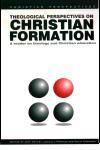
Twenty-nine articles from international journals that ‘will provide the reader with both a comprehensive map of how contemporary Christian theologians approach the tasks of Christian education, and also skilfully selected excursions in the complex terrain. . . . Christian educators cannot fail to profit from this helpful book’ (Rt Revd Professor Stephen Sykes). ‘A wonderful collection that gives perspective on issues still simmering. I love the way the book has been organized’ (Michael Warren, St John’s University, New York). ‘An invaluable collection of essays’ (Journal of Beliefs and Values). ‘An excellent volume’ making an ‘outstanding contribution’ (Spes). ‘Indispensable . . . a veritable gem of a collection’ (Journal of Education and Christian Belief). ‘A significant aid to practitioners in the fields of education and in training for ministry both lay and ordained’ (Theology). ‘ An important and representative sample of the writing about Christian education and theology in the major academic centers of the English-speaking world in the last quarter of the twentieth century. . . . this book includes some of the best work of the more profound writers currently working in the area . . . . It is . . . an important addition to the documentation of the scholarship in Christian education . . .’ (Anglican Theological Review).
Jeff Astley, Leslie J Francis and Colin Crowder (eds), Theological Perspectives on Christian Formation: A Reader on Theology and Christian Education
(Leominster: Gracewing Fowler Wright/Grand Rapids, Mich: William B Eerdmans, 1996)
ISBN: 0 85244 288 2 xix + 464 pp £18.99
Contributors include: Walter Brueggemann, Rebecca Chopp, Craig Dykstra, Edward Farley, Paulo Freire, Mary Grey, Stanley Hauerwas, James Loder, George Lindbeck, John Tinsley, David Tracy and Charles Wood.
Planning to Learn
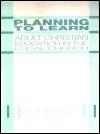
Edited by Jeff Astley with a Foreword by Bishop Alec Graham, Guy Buckler’s Planning to Learn handbook has been written to assist all those involved in parish adult Christian education to assess the needs for Christian learning, to plan programmes and events, choose appropriate resources and evaluate progress.
Guy Buckler, Planning to Learn: Adult Christian Education in the Local Church
(Leominster: Gracewing Fowler Wright, 1998)
ISBN: 0 85244 423 0 72pp £7.99
‘A strong and supportive challenge to all who carry responsibility for adult learning in the Churches. Yes, buy it! And, please, use it!’ (Viewpoints). ‘Churches that take seriously the issues raised in this . . . helpful book will be better equipped to respond to the opportunities and challenges of adult Christian education’ (Church of England Newspaper).
Learning in the Way
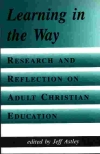
A collection of essays that provides an accessible but authoritative introduction to a wide range of issues in the Christian education of adults, including: Aims, Approaches and Principles of Adult Christian Learning; Faith Development in Adults; Survey Methods and Results; the Role of the Teacher in the Theological Education of Adults; All-Age Learning; Assessment in Adult Christian Education. ‘This book, from the leading Christian education research centre in the UK . . . offers adult Christian learning providers a powerful tool to create more purposeful and coherent learning programmes, undergirded by sound theological understanding’ (Ian Stubbs, National Adviser in Adult Learning, Church of England). ‘I can’t think of anything better to put in the hands of students (of any age) wanting to gain an overall grasp of the issues in adult Christian education . . . this is an excellent introduction which clarifies without oversimplifying and orders without distorting’ (Viewpoints). ‘A helpful and stimulating collection of essays . . . . [that] deserve to be read carefully by anyone seeking to help Christian adults learn’ (Modern Believing). ‘Where else could you get such an insightful and wise overview of issues deep at the heart of adult Christian education?’ An ‘excellent book’ (British Journal of Theological Education). ‘I found the book extremely inspiring and affirming, and think that every adult Christian educator should have a copy for reference. I will most certainly promote it to our facilitators here at the Leadership Training Centre’ (Rev Phyllis Thompson, Education Director, New Testament Church of God).
Jeff Astley (ed.), Learning in the Way: Research and Reflection on Adult Christian Education
(Leominster: Gracewing, 2000)
ISBN: 0 85244 419 2 224pp £15.99
Contributors include: Jeff Astley, Leslie Francis, Meg Orr, Judith Sadler, Mark Savage, Roger Walton and Carolyn Wilcox.
Creative Chords
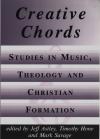
Originating in NEICE-sponsored symposia, these fourteen original essays present a synoptic view of the musical experience that incorporates theological, psychological, philosophical, educational and other perspectives, and draws on practical experience and empirical research. Together they offer a multi-disciplinary resource for reflecting on the relationship between music, theology and Christian learning.
Jeff Astley, Timothy Hone and Mark Savage (eds), Creative Chords: Studies in Music, Theology and Christian Learning
(Leominster: Gracewing, 2000)
ISBN: 0 85244 424 0 230pp £15.99
Musical contexts and experiences include: Composing, Performing and Listening; Worship and Hymnody; Classical Music and Jazz.
Contributing disciplines and fields of study include: Christian Theology and Spirituality; Aesthetics; Education and Learning; Psychology of Music.
‘An original book, thought-provoking and challenging, and greatly to be welcomed . . . . There is a refreshing mix of contributors here, reflecting the true diversity of human experience, in the light of faith and in music’ (Church Times). ‘For those concerned with music, worship and education – in any combination – this is a rich and encouraging resource’ (Church Music Quarterly). ‘A book to broaden and deepen our awareness and our Christian ministry . . . . The contributions of the three editors are very fine’ (Organists’ Review). ‘The collection is groundbreaking in the sense that it sets out to establish a fresh way of discussing the interface between theology and music and to establish a framework within which a serious discussion of the theology of music can take place’ (The Church of England Newspaper). ‘The book as a whole has a well-structured and systematic coherence. . . . It is a delight to see this broad-based, ecumenical and challenging collection published’ (Music & Liturgy). ‘A ground-breaking and original book . . . . A major achievement’ (Professor Ann Loades, CBE).
Contributors include: Jeremy Begbie, Ian Ground, Bill Hall, Martin Haselböck, Timothy Hone, James MacMillan and John Sloboda.
Psychological Perspectives on Prayer
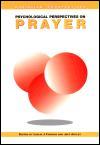
This collection of thirty articles details empirical research on prayer in a variety of contexts. Sections include ‘Personality and Prayer’, ‘Prayer and Health’, ‘Prayer and the Quality of Life’, ‘Prayer and Religious Development’, ‘Adolescents and Prayer’ and ‘Effects of Intercessory Prayer’. ‘The book opens up a large and relatively unexplored field in a useful way. Some of the conclusions are absorbing . . . others are alarming’ (Theology). ‘The editors have assembled, in a readily accessible form, a diversity of studies from a wide range of journals. . . . Psychological Perspectives on Prayer should be of great interest to anyone interested in prayer from either psychological or theological perspectives, but more specifically to those engaged in the social scientific study of religion. The editors are to be congratulated for illustrating both the strengths and weaknesses of empirical research concerned with prayer’ (Pastoral Psychology).
Leslie J Francis and Jeff Astley (eds), Psychological Perspectives on Prayer: A Reader
(Leominster: Gracewing, 2001)
ISBN: 0 85244 518 0 xiv + 392pp £25.00
Contributors include: Laurence Brown, Leslie Francis, Ralph Hood, John Finney, Newton Malony and Bernard Spilka.
The Fourth R for the Third Millennium
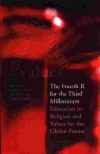
A collection of ten original papers by members of the International Seminar on Religious Education and Values. Topics include: Religious Education and Education about Science; Adolescent Values and Beliefs; School Worship and Spirituality; Fundamentalism and Religious Education. ‘I shall be grateful for this book on all my Theology and RE modules’ (International Journal of Education and Religion). ‘An important and well-informed book that reframes perennial debates within religious education. . . . It presents new concepts, fresh perspectives [and] new solutions to basic educational problems’ (Journal of Beliefs and Values).
Leslie J. Francis, Jeff Astley and Mandy Robbins (eds), The Fourth R for the Third Millennium: Education in Religion and Values for the Global Future
(Dublin: Veritas, 2001)
ISBN: 1 85390 507 0 254 pp £11.99 15.22 euros
Contributors include: Jeff Astley, Mark Halstead, Brian Hill, Mary Elizabeth Mullino Moore, Friedrich Schweitzer, Andrew Wright and Hans-Georg Ziebertz.
Children, Churches and Christian Learning
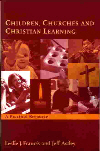
This book introduces a wide range of topics relevant to children’s ministry, religious formation, school RE and worship. There are 44 chapters in six parts: Bible and Church, Children and Faith, Children and School, Ministry and Children, Children and Change, Means and Methods. ‘A valuable tool for a wide readership’; ‘the depth of personal knowledge and research prevents the book’s various sections becoming summaries’; ‘ a helpful contribution to promote the religious, moral and spiritual development of children and young people’ (British Journal of Religious Education). ‘Essential reading for anyone who works with children in Christian education’ (RE News).
Leslie J Francis and Jeff Astley (eds), Children, Churches and Christian Learning
(London: SPCK, 2002)
ISBN: 0 281 05532 7 298pp £16.99
Contributors: Jeff Astley, Ann Faulkner, Geraint Davies, Leslie Francis, William Kay, David Lankshear and Will Strange.
Ordinary Theology
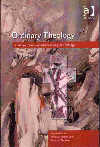
The study of ‘ordinary theology’ encompasses the nature and logic of the everyday belief (and unbelief) of those who are innocent of theology in its academic form and context. Jeff Astley’s monograph, Ordinary Theology: Looking, Listening and Learning in Theology, analyses the problems and possibilities of research and reflection in this area. The book explores the philosophical and theological dimensions of the concept of ordinary theology, its significance for the work of the theologian as well as its value to those engaged in the ministry of the church, and the criticisms that it faces. The author argues that an in-depth study of ordinary theology can help recover theology as a fundamental dimension of every Christian’s vocation.
‘A rich and evocative study, which has much to contribute to the fields of practical theology and congregational studies. . . a work brimming with clarity and perception . . . an excellent book which I shall recommend to my colleagues and students’ (Revd Professor Martyn Percy). ‘This is a book that appeals to academic theologians to come down to meet the concerns of everyday church members or vague believers and to listen to what they have to say. . . . We have not merely been given the distillation of wide reading and long thinking but something much more from the heart. . . . I warmly recommend it’ (Journal of Beliefs and Values). ‘For those interested in issues of learning, theological method, religious research, and the faith of “ordinary people” it will prove a valuable resource. A very worthwhile study indeed’ (Regent’s Review). ‘His appreciation of learning theory is impressive and he masterfully applies [it] to religion to show that our acquisition of religious belief is a personal thing’; ‘Jeff Astley argues his case fully and convincingly . . . . This is an important book with an important message for everyone involved in parish work and especially those concerned in training priests and parish workers’ (Rural Theology). ‘[It] stands out as an extraordinary introduction to ordinary theology, analyzed and expounded in a multidisciplinary perspective and in an engaging manner. . . This book will certainly be of much use to those involved in the field of practical, pastoral and empirical theology. As a reflection in the theologizing of ordinary Christians, written in very lucid and accessible language, the book [also] makes interesting reading for ordinary Christians’ (Journal of Empirical Theology). ‘This is a work that deserves to be widely read, by philosophers of religion and academic theologians, as well as by practical theologians, pastors, educators, ministers, ordinands and others in training for ministry, and research students….[T]he quality of the writing is a pleasure to read; woven into the philosophical precision and clarity there is humour, even a passion of sorts, certainly a strong conviction and a nice commitment to the dignity, even the beauty, of the ordinary’ (The Journal of Adult Theological Education). ‘This is a scholarly work, and the erudition of the author appears on every page . . . . a fascinating book which will be of interest to all who are concerned with what “ordinary” people have as their “theology” and who wish to understand it better’ (Implicit Religion). ‘Without a doubt, academic theology could benefit from broadening its horizons in these directions’ (Religious Studies Review).
Published in the Series of Explorations in Practical, Pastoral and Empirical Theology by Ashgate Publishing (now Routledge).
Jeff Astley, Ordinary Theology: Looking, Listening and Learning in Theology
(Aldershot: Ashgate, 2002)
x + 199 pp ISBN: 0 7546 0584 1 paperback £25.00
ISBN: 0 7546 0583 3 hardback £55.00
Contents Order direct from Publisher
Ways of Faith
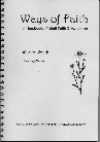
Marion Smith’s handbook offers an in-depth guide to faith development research, illustrated by extensive quotations from some fifty-two interviews undertaken in Britain by the Faith Development Research Group, the great majority with adults. Eight interviewees were interviewed again after the passage of several years, thus providing a unique example of a longitudinal study in faith development. The volume will serve as a detailed introduction to the subject for students, as well as a practical guide for researchers. It will also be of value to those involved in Christian education or pastoral ministry with adults.
Marion Smith, Ways of Faith: A Handbook of Adult Faith Development
edited by Jeff Astley
(Durham: NEICE, 2003)
A4 format 244 pp paperback £10
The Idea of a Christian University
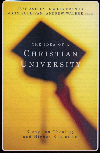
In this timely and provocative publication, seventeen original essays from scholars from across the world re-examine the idea of a Christian University and address a radical alternative vision for the future of the academy. The contributors represent Anglican, Catholic, Protestant and Orthodox traditions. They engage with the principles, vision and practice of Christian learning in higher education from a range of theoretical, historical, empirical and critical viewpoints; as well as analysing the implications of the concept of a Christian University for the teaching of theology, philosophy, natural science, politics and educational studies.
‘The incompatibility of Christian conviction and academic freedom is one of the shibboleths of modern educational thinking. This stimulating work from a variety of international contexts challenges this idea with lively contemporary argument – a compelling read!’ (Rt Revd Professor Stephen Sykes). ‘A challenge both to utilitarian notions of higher education and to ghettoisation. A good read for anyone who thinks universities need souls, and a must-read for those who don’t’ (Revd Dr Joe Cassidy). ‘A splendid collection of essays’ (Revd Professor Martyn Percy). ‘This collection of essays both broad and deep offers an honest exploration of what it means to be a Christian university . . . That the truth the essayists offer celebrates rationality and conversation as the quest of the Christian university serves to create a compelling argument for the Christian university as incarnating the mystery of truth in its ethos and mission. . . . Clear and compelling explorations’ (Theological Book Review). ‘This is a thought-provoking book . . . It is certainly worth the attention of anyone concerned about Christian education, and not just at the level of higher education’ (Journal of Education and Christian Belief). An ‘excellent and highly educative collection of essays.’ ‘The jury is still out on what kind of institutions might be appropriate in a UK context, but these essays provide very valuable evidence to put before them’ (Christian Academic Network). ‘A spirited defence of the idea of a Christian university against its cultured detractors. . . . This is a rich collection of essays that should be read by anyone working in a Christian university. Against the deadening “skills” agenda, these essays strongly valorize the acquisition of knowledge for its own sake and the development of powerful analytical and synthetic abilities that will enrich the lives of students after graduation, whatever they go on to do. All this will be welcomed by those who . . . regard [all] universities as bastions of truth- and value-seeking in challenging and celebrity-obsessed times’ (Theology).
Jeff Astley, Leslie Francis, John Sullivan and Andrew Walker (eds), The Idea of a Christian University: Essays on Theology and Higher Education
(Milton Keynes: Paternoster, 2004)
316 pp ISBN: 1 84277 260 0 paperback £19.99
Contributors include: R J Berry, David Carr, Gavin D’Costa, Gerard Loughlin, Patricia Malone, Ian Markham, Elmer Thiessen and John Sullivan.
A Reader on Preaching
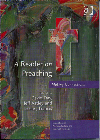
This reader of twenty-nine journal articles from international experts in the area of homiletics is practical without being merely tips for preachers, and provides a grounding in the theoretical issues that are essential for anyone who wishes to take preaching seriously. The book offers a first-class introduction to the principles, processes, context and theology of preaching. It includes sections on ‘Trends in Preaching’, ‘Structure and Communication’, ‘Personal Qualities and the Preacher’, ‘Story and Imagination’, ‘Preaching and Worship’, ‘The Woman as Preacher’ and ‘Evaluating the Sermon’.
‘This volume skilfully samples seminal resources offered to preachers in the last several years for vocational discernment and renewal. Nourished by such insights from distinguished colleagues, homileticians and pastors alike will gain strength for the journey’ (David Schlafer, Homiletic Foundation, Washington, DC). ‘At last! Distilled wisdom about preaching today by “A” list writers and practioners’ (Martyn Atkins, Cliff College, UK). ‘The editors . . . have collected essays from among the most important names in homiletic theory. They have given us a work impressive for its accessibility and range. . . . A Reader on Preaching is certainly a welcome addition to my bookshelf’ (Worship). A ‘valuable and stimulating compendium . . . . a good thought-provoking resource’ (Anvil). ‘A guide to the intense debate which has taken place in homiletics over the past thirty years. . . . there is a welcome emphasis on what the hearer brings to the sermon, and on the preacher as providing a basis for each member of the congregation to develop his or her own particular sermon. . . . The quality of the articles is high . . . . The editors have completed their difficult task with great skill, and have given us a most valuable anthology.’ (Philip Crowe, Theology). ‘This is a seriously good book . . . . well conceived and well compiled: it has an outstanding introductory chapter by David Day which allows the reader to get their bearings and see how the various parts fit together into the whole, and the collection stands as a very fine introduction to the current literature and thinking on preaching. It deserves to be in the library of every preacher who takes their task seriously. . . . Highly recommended!’ (Regent’s Review). ‘This book . . . is very welcome. . . . First it provides some concise introductions to recent thinking and in some cases helpfully summarizes major books or schools of thought in an accessible way. . . . Its second value lies in challenging experienced preachers whose method has perhaps become as tired and as yellowed as some of their sermon scripts. . . . These articles will bring fresh challenges, provoke new imagination and stir up stagnant gifts of communicating God’s word. The breadth of the volume adds to its benefit’ (Evangelical Quarterly). ‘A very helpful and useful contribution to the literature. . . .the volume will be helpful to all preachers whether they are just starting or have been called for many years. This book is not to be read and then put away on the shelf, rather it is a book to keep on the desk and use to support fresh thoughts and ideas as the preacher’s call grows and matures’ (Rural Theology). ‘The articles are practical without being merely a collection of tips for preachers, and no important issue has been omitted. . . . They chasten those who make the sermon merely an exercise in motivational speaking, . . . and encourage preachers to instead deliver impassioned, full-gospel sermons that refuse to compromise the message of the biblical text’ (Mission Studies).
David Day, Jeff Astley and Leslie J Francis (eds), A Reader on Preaching: Making Connections
(Aldershot: Ashgate, 2005)
291 pp ISBN: 0 7546 5009 X paperback £18.99
ISBN: 0 7546 5003 0 hardback £57.50
Contributors include: Walter Brueggeman, David Buttrick, Fred Craddock, David Day, Edward Farley, John Killinger, Richard Lischer, Elaine Lawless, Thomas Troeger and Thomas Long.
Foreword by Bishop Tom Wright.
Contents Order direct from Publisher
Religion, Education and Adolescence

This collection of twelve original empirical studies is sponsored by the International Seminar on Religious Education and Values. It draws together Christian, Muslim and Jewish researchers from the United Kingdom, Germany, Israel, Norway and Turkey, who employ a range of qualitative and quantitative methods from psychology, sociology and anthropology to explore the religious and educational life of contemporary youth. Themes addressed include: prayer, personality and purpose in life; credulity and the science/religion interface; religious experience and religious education; the impact of religious schooling; spirituality and religious orientation; inter-religious learning; and citizenship and religious education.
‘With its focus not just on data analysis but also exploration of the implications for educators and education, this collection is likely to provoke useful debate on how educators, policy-makers and religious congregations should respond to changing attitudes and values among young people’ (Youth & Policy). ‘Religion, Education and Adolescence will . . . be of value to researchers into the interface of religion and education and, potentially, to students in training for teaching religious education who want to learn how to undertake empirical work with the children they teach and to read what some recent findings have to say about their attitudes’ (British Journal of Religious Education).
Leslie J Francis, Mandy Robbins and Jeff Astley (eds), Religion, Education and Adolescence: International Empirical Perspectives
(Cardiff: University of Wales Press, 2005)
272 pp ISBN: 0 7083 1957 2 hardback £45
Contributors include: William Kay, Leslie Francis, Judith Everington, David Lankshear, Abdullah Sahin, Heinz Streib and Hans-Georg Ziebertz.
Contents Order direct from Publisher
Fragmented Faith?

This empirical study of the beliefs and attitudes of current members of the Church of England, based on over 7,600 responses to a Church Times survey, suggests new ways of looking at the divisions, disagreements and solidarities of the Established Church at a significant period of its development. The study draws attention to three particular fault-lines within the Church of England: the continuing differences between evangelicals and Catholics, liberals and conservatives, charismatics and non-charismatics. But the fragmentation is more profound than these distinctions of church orientation. This well-informed, up to date and perceptive analysis shows that the real divisions are between the generations, between the sexes, and between the laity and the clergy.
‘Highlights the growing importance of distinct theological and liturgical traditions, and assesses their influence and relevance in the context of a broad church . . . No-one who wishes to understand the nature of Anglicanism today can afford to ignore it’ (John Drane, Author of The McDonaldization of the Church). ‘Fragmented Faith? reveals a Church with fault-lines so deep and so varied that we are faced with a Communion which is not merely fissiparous but one likely to explode’ (Andrew G Walker, Canon Professor of Theology, Culture and Education, King’s College, London). ‘This well-informed, intelligent study offers a careful and empirically-based analysis of current fault-lines in the Church of England. It should be required reading for church leaders, bishops, clergy, laypeople alike’ (Robin Gill, Michael Ramsey Professor of Modern Theology, University of Kent at Canterbury).
Leslie J Francis, Mandy Robbins and Jeff Astley, Fragmented Faith? Exposing the Fault-Lines in the Church of England
(Milton Keynes: Paternoster, 2005)
182 pp ISBN: 1 84277 382 5 paperback £19.99
Peace or Violence
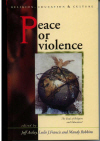
Do religions and religious education intend peace or violence, and which of these ends do these activities really serve? While many claim that religion is responsible for most of the violence that currently poisons the peace of peoples and nations, and some seek a moratorium on religious education as a necessary preliminary to creating a peaceful society, the authors of these essays contend that religious education itself can be a force for peace. Certainly, issues of peace and violence should be of central concern to those who teach and explore religion and its communication. This collection of original studies is sponsored by the International Seminar on Religious Education and Values. It draws together Christian and Jewish perspectives, as well as approaches from education, philosophy and sociology, from scholars working in England, Germany, Israel, Kenya, Norway, the United States and Wales.
‘This book will be valuable for teachers, scholars and students in religious education, religious formation, and theology and religious studies; as well as those who work in areas such as politics and social ethics. It should be of particular interest to religious leaders and religious commentators who are concerned with questions of inter-religious dialogue, tolerance, faith schools and general education; and to every citizen who cares about the cohesion of society and the welfare of all humankind’. ‘This is an important book that could well play an important part in understanding and dealing with radicalised young people in Britain today’ (The Church of England Newspaper). These essays ‘offer some fascinating and thought-provoking insights . . . Anybody teaching RE, academic theologians or those with a general interest in improving interfaith dialogue will find something to interest and challenge in these essays. As such they make a useful contribution to the current debate about how to inculcate harmonious relations between those of different faiths and viewpoints’ (Journal of Education and Christian Belief). ‘A remarkable work’ (Panorama). ‘Peace or Violence is not only an excellent book for people in education, political science, and theology, but also a fine and important text for all concerned people in our modern, increasingly troubled world’ (Journal of Beliefs and Values). ‘The writing is accessible and the discussions are scholarly, drawn from the authors’ research studies. These deal with serious and complex issues that are pertinent to a global society today and they combine a range of ideas and perspectives. . . . the book reflects the message it sets out to deliver: that a careful scrutiny of issues related to religion, peace and violence, which is respectful of different viewpoints, can yield positive results and, therefore, raises the potential to promote a peaceful and cohesive society. . . this book is a timely and welcome addition to the field and will be a useful addition to the libraries of academics and students who are engaged in various disciplines related to education and religious and cultural practices’ (International Journal for Children’s Spirituality).
Jeff Astley, Leslie J Francis and Mandy Robbins (eds), Peace or Violence: The Ends of Religion and Education?
(Cardiff: University of Wales Press, 2007)
ix + 222 pp ISBN: 978 0 7083 2078 5 hardback £75
Contributors include: John Hull, Gareth Lloyd Jones, Eunice Kamaara, Gabriel Moran, Karl Ernst Nipkow, Jack Priestley and Andrew Wright.
Contents Order direct from Publisher
Taking Ordinary Theology Seriously
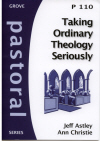
Where do we look for theology? Who does it, and who owns it? The authors argue that there is such a thing as ‘ordinary theology’. It exists outside the university and the theological college; nevertheless, it should be taken seriously.
Taking Ordinary Theology Seriously includes an analysis of interview studies in which regular churchgoers reflect on their beliefs about the person and the power of Christ. Their views raise important issues for the pastoral and educational ministry of the church.
A ‘brief, fascinating and encouraging journey’ (Journal of Education and Christian Belief).
Jeff Astley and Ann Christie, Taking Ordinary Theology Seriously
(Cambridge: Grove Books, 2007)
28 pp ISBN: 978 1 85174 658 3 paperback £3.95
Contents Order direct from Publisher
Empirical Theology in Texts and Tables

Empirical Theology offers fresh and stimulating insights into the concerns of the Church and the Academy by accessing relevant empirical evidence using the tools of the social sciences, and placing this evidence in the context of theological critique and contemporary debate. This collection of sixteen essays, developed from the third conference of the International Society of Empirical Research in Theology, seeks to display and assess the strengths of empirical theology across the three domains of theoretical elaboration, qualitative methodologies and quantitative methodologies.
Leslie J. Francis, Mandy Robbins and Jeff Astley (eds), Empirical Theology in Texts and Tables: Qualitative, Quantitative and Comparative Perspectives
(Leiden: Brill, 2009)
xvi + 407 pp ISBN: 978 90 04 16888 6 hardback €109
Contributors include: Jeff Astley, Tania ap Siôn, Mark J. Cartledge, Ann Christie, Jaco S. Dreyer, Leslie J. Francis, Chris A.M. Hermans, William K. Kay, Constantin Klein, Stefan Huber, Ulrich Riegel, Hans Schilderman, Friedrich Schweitzer, Johannes A. van der Ven and Hans-Georg Ziebertz.
Contents Order direct from Publisher
Teaching Religion, Teaching Truth
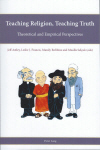
Religious educators today are called upon to enable young people to develop as fully-rounded human beings in a multicultural and multifaith world. It is no longer sufficient to teach about the history of religions: religion is not relegated to the past. It is no longer sufficient to teach about the observable outward phenomena of religions: religion is not restricted to practices, artefacts, and buildings observable in the outside world. It is also necessary to take seriously what religions believe themselves, and what religions believe about other religions. Seen from the inside, religions deal in the currency of truth. For the religions themselves, truth matters. Truth-claims can lead to harmony and peace, but they may also engender discord and violence. What ultimately counts is how one set of truth-claims confronts or embraces the truths claimed by other, different voices. Therefore those who teach religion cannot avoid dealing with the theology of religions.
In this collection of original essays, religious educators shaped by both Christian and Islamic worldviews discuss the problems and opportunities that now face educators and believers alike, as they are confronted by the challenge of teaching religion and teaching truth. The discussion nurtured at the sixteenth conference of the International Seminar on Religious Education and Values is here developed further, to stimulate wider reflection and shape good local practice.
Jeff Astley, Leslie J. Francis, Mandy Robbins and Mualla Selçuk (eds), Teaching Religion, Teaching Truth: Theoretical and Empirical Perspectives
(Bern: Peter Lang, 2012)
281 pp ISBN: 978 3 0343 0818 2 paperback £38
Contents:
Gloria Durka: Theology of Religions: Through the Looking Glass of US Roman Catholicism
Friedrich Schweitzer: Principled Pluralism and Theology’s Contribution to Religious Education: A Protestant Perspective
Mario O. D’Souza: Identity, Diversity, and the Common Good
Fernando A. Cascante-Gómez: Pluralist Latin American Liberation Theology: Theological Themes and Educational Challenges
Kath Engebretson: Interfaith Education in the Christian School
Mualla Selçuk: How Can Islamic Pedagogy Promote an Understanding of ‘Individualized Religion’?
Recai Doğan: An Ottoman Example of the Perception of Other Religions in Islamic Thought
Z. Şeyma Arslan: A Holistic Approach in Education from the Perspective of the Islamic Understanding of Human Beings
Elisabeth Arweck and Eleanor Nesbitt: The Interaction of the Major Religions at Microcosmic Level: Religiously-Mixed Families in the UK
Hans-Georg Ziebertz: The Catholic View on Religious Pluralism in Empirical Perspective
Marian de Souza: The Dual Role of Unconscious Learning in Engendering and Hindering Spiritual Growth: Implications for Religious Education in Pluralist Contexts
Leslie J. Francis and Mandy Robbins: The Theology of Religions and Psychological Type: An Empirical Enquiry among Participants at the Parliament of the World’s Religions
Üzeyir Ok: How Open is Muslim Youth to People of Other Faiths?
Jeff Astley: A Theological Reflection on the Nature of Religious Truth
‘Each essay is clearly written, soundly argued and makes a valuable contribution to our understanding of key pedagogical and cultural issues that are relevant to religious educators across the world. This is a high-calibre addition to the field, one that teachers and those involved in initial and in-service education in religious education should read with close attention. . . . In a magnificent chapter offering a theological reflection on the nature of religious truth, one that on its own makes the book worth reading (and this is not to denigrate all the other fine contributions), Jeff Astley offers a persuasive argument that, in teaching religion, we need to go beyond a study of texts, practices and history (which on its own might convey only a second-hand religion) to illuminate what is entailed by the “religious embrace”’ (Professor John Sullivan, Theological Book Review).
Exploring Ordinary Theology
![[Book cover]](https://neice.webspace.durham.ac.uk/wp-content/uploads/sites/248/2021/04/EOT.jpg)
‘Ordinary theology’ characterizes the reflective God-talk of the great majority of churchgoers, and others who remain largely untouched by the assumptions, concepts and arguments that academic theology takes for granted. Jeff Astley coined the phrase in his innovative study, Ordinary Theology: Looking, Listening and Learning in Theology, arguing that ‘speaking statistically, ordinary theology is the theology of God’s Church’. A number of scholars have responded to this and related conceptualizations, exploring their theological implications. Other researchers have adopted the perspective in examining a range of Church practices and contexts of Christian discipleship, using the tools of empirical study. Ordinary theology research has proved to be key in uncovering people’s everyday lay theology or ordinary dogmatics.
Exploring Ordinary Theology presents fresh contributions from a wide range of authors, who address the theological, empirical and practical dimensions of this central feature of ordinary Christian existence and the life of the Church.
Jeff Astley and Leslie J. Francis (eds), Exploring Ordinary Theology: Everyday Christian Believing and the Church
(Farnham, Ashgate, 2013)
xiv + 238 pp
ISBN: 9781409442561 (hbk) £55 ISBN: 9781409442578 (pbk) £19.99
ISBN: 9781409442585 (ebk PDF)
Contents and Contributors Order direct from Publisher
‘This extraordinary collection of articles exploring Ordinary Theology is a must-read, showing the real significance of listening to what ordinary reflective Christians believe – consulting the faithful – in order to uderstand how diversely the tradition can be lived in and lived out.’
(Terrence W. Tilley, Fordham University, New York)
‘This volume demonstrates how Ordinary Theology is rapidly becoming one of the most exciting and innovative areas in Practical Theology.’
(Pete Ward, King’s College, London)’
‘A decade ago Jeff Astley introduced the concept of ‘ordinary theology’ into theological discourse. He was pointing to the widespread ignorance of how the majority of the Christian community, that is, those who are not theologically trained but who learn their faith piecemeal through corporate worship, private devotion or popular education programmes, understood their faith. However, he also argued that this was more than a matter of sociological ignorance. Here is a theological resource that could be mined, a contribution to the on-going development of the tradition. This valuable volume both celebrates and evaluates what has developed since then as others have taken up the challenge. The twenty-one essays, divided into two parts, of almost consistent high quality and interest, provide a useful survey of and introduction to the field. . . . [T]hat ordinary theology is increasingly becoming a recognized factor within theological activity should be greatly welcomed’ (Theology). ‘This is a fascinating group of essays, exploring the nature and nurture of Christian belief at a local level. It is a (wake-up) call to listen carefully to the way Christian faith is articulated amongst those many of us serve. Whilst we must continue to read Barth, Gunton, Moltmann, Hauerwas, Coakley, at the same time, we must not be ignorant or dismissive of faith in a more “ordinary” tongue. . . . For the minister, this book will encourage you to listen carefully to your congregation and to think more intentionally, for example, about what is communicated in terms of how the Bible is read, preached, interpreted, what is sung and prayed. For the student, this book will challenge you to see the gap between academy and church in terms of God-talk and to see the tension and assumptions made. I am in no doubt that studies and research into ordinary theology will continue to grow and that this will produce both interesting and exciting conversations at the interface between ordinary and extraordinary theology’ (Regent’s Reviews). ‘Astley and Francis bring together well-researched chapters on what ordinary Christians believe and why it is important to take their faith expressions seriously in academic theological studies and church life. . . . Attending to such beliefs and processes of believing can enrich Christian theology and practice. . . . The diversity in exploring the terrain of ordinary theology and in applying these approaches [empirical, descriptive and evaluative, reflective] can be regarded as the volume’s major strength. . . . engaging in a critical analysis of ordinary theology can enable a conversation between academic and ordinary theology, allowing each to enrich the other. Scholars and students in a variety of theological studies should find this volume very helpful’ (Theological Studies). This book ‘brings together a rich and diverse series of studies that will introduce ordinary theology to anyone interested in its approaches and perspectives, and stimulate others who are established in the field. . . . This ground breaking collection of essays really ought to be on the reading list of everyone training for authorised or representative ministry, while those in ministry will learn much from it that will refresh their commitment. As a concluding thought, it would be a pity if the creative content of the book remained only in the hands of academics that have an interest in ordinary theology, and did not find its way back to ordinary theologians themselves for the enriching of their discipleship’ (Rural Theology).
See also Explorations in Practical, Pastoral and Empirical Theology Series for other publications in Practical Theology by Ashgate Publishing (now Routledge).
See also Religion, Education and Culture Series for other publications on Religion and Education by the University of Wales Press.
See also Adult Christian Education, Theology and RS Students for titles in the ‘Exploring Faith: Theology for Life’ series from Darton, Longman and Todd and the ‘Problems in Theology’ series from T & T Clark International, together with other titles for students and general readers.
See also Books of Popular/Ordinary Theology and Spirituality for more popular publications.
